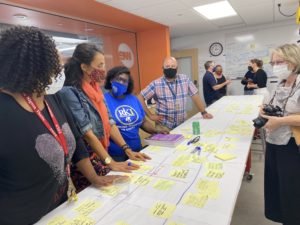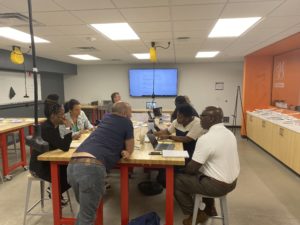Our focus for the Collab Lab 47 was a reflection on what we’ve learned over the first year of our Fellows Program. Prior to the Collab Lab we sat down with a our Fellows for a conversation about what they wanted to get out of the discussion. The first two questions we settled on are a reflection of where the Fellows see value in the program and partners.

Too often teachers are offered programming or resources without the recognition of what else might need to be in place, or the additional work required of a teacher to take advantage of them. Nothing interesting happens in a classroom without a teacher willing to say “yes”, and that comes when we solve problems for teachers. That lead us to our first question for the evening:
What makes an offering of support for teachers a gift rather than just one more thing to take on?
- Collaboration
- share the workload
- cross pollinate ideas
- It’s real
- service learning
- connected to community
- multidisciplinary
- PBL
- Engages students
- students work to develop solutions
- It fills a known gap for the teacher
- A curriculum framework that:
- is completed
- is documented
- integrates outside expertise that know how to work with students
- is updated
- provides a prescription for how to execute with room to flex
- Provides resources for both students and teachers to execute
- Helps students develop 21st century skills
- Builds career connection
- Field experiences (free is good)
- Provides access to mentors
- Kids are engaged and motivated
- Aligns with standards
- Provides opportunities for problem solving/authentic learning
- Can be extension projects
- Multiple points of alignment/integration with curriculum
- Provides a chance to showcase the work of students
- Streamlined partnerships/easily accessed resources
- Listen first, keep listening
- find openings
- point out success teachers have
- Create Joy
- Be transparent
- Extend gratitude
- Ask for feedback
- Don’t be scary
- Goals that differ from teacher
- time consuming
- unaware of pacing guide, constraints, or not connected to standards
- offering doesn’t complement curriculum
- Too scripted and prescriptive
- Focus on kids’ learning
Through the Collab Labs and work with program partners over the course of the year, the Fellows see a lot of value in understanding how those outside of education approach parallel problems. Collaboration is important to the fellows, both in terms of providing a richer set of experiences for their students, and also to share the load with colleagues and to learn from what peers may have tried. That led us to our second discussion point for the evening:
How do you form a relationship with colleagues conducive to creating a collaborative culture focused on learning?
- Share successes
- Create opportunities for shared learning experiences
- Focus on kids motivation and engagement
- Provide opportunities for casual, open-ended conversations
- Make it a regular practice
- Practice collaboration across different content areas
- Use student presentations as a chance to collaborate/share with colleagues.
- Foster trust
- Be supportive
- Model collaboration/continuous learning during the school day
- Build diversity into the process with a range of levels of
- expertise
- knowledge
- experience
- Establish norms for
- sharing
- listening
- encouraging all to share
- process and project management approaches
- Establish accountability
- universal
- commitment
- Recognize that preferred modes of communication will vary between colleagues
The third question for the evening came from our shared goal of ensuring that all Milwaukee students have the chance to participate in the kind of community engaged, real world, learning experiences that can help them both uncover what they are passionate about, and see paths forward to pursue those passions.
How do we make these opportunities equitable and accessible to all students?
- Engage all students from the outset and provide
- choice – enable students to approach and pursue the challenge from the points where they are most engaged
- flexibility – be creative/flexible about how the learning experience might evolve, and where it might lead
- anticipate and address barriers that may limit participation or engagement for some students
- Maintain a growth mindset
- Provide a safe place, where it is ok to be vulnerable
- Focus on others strengths
- Connect to what learners love
We we’re glad to see a high level of engagement around the questions, and, as usual, very different approaches to documenting each group’s conversation. That the conversations continued well after we wrapped things up is a measure of success for the process.
Thanks again to our Fellows for guiding the discussion and MSOE’s STEM Center for hosting us!

 Our Learn Deep Fellows wrapped up the STEM Studio workshop on Friday with a presentation and discussion of their projects to colleagues and program partners. The projects developed over the course of the past two weeks focus on water, but are aimed at the much larger goals the fellows have for their students– that they can see a broad range of career possibilities, that they can see themselves as creators and that they think of themselves as someone who can make a difference in their community. Those three goals led to a sequence of three projects which flow together over the course of the school year.
Our Learn Deep Fellows wrapped up the STEM Studio workshop on Friday with a presentation and discussion of their projects to colleagues and program partners. The projects developed over the course of the past two weeks focus on water, but are aimed at the much larger goals the fellows have for their students– that they can see a broad range of career possibilities, that they can see themselves as creators and that they think of themselves as someone who can make a difference in their community. Those three goals led to a sequence of three projects which flow together over the course of the school year. The STEM Studio sessions for our Learn Deep Fellows kicked off today at MSOE. Over this week and next our Fellows will work together with input and support from community partners to design of real-word challenges focused on water. Today’s work began with a focus on goals Fellows have for the program. Through repeated cycles of asking “Why?” we saw those goals grow from tactical hopes for the skills students or teachers might development to visions our Fellows have for their students — that they can see themselves as creators, citizens, individuals who can make a difference in their community. We’ll use those much loftier goals drive the vision for projects knowing that we can hit the initial, tactical ambitions along the way.
The STEM Studio sessions for our Learn Deep Fellows kicked off today at MSOE. Over this week and next our Fellows will work together with input and support from community partners to design of real-word challenges focused on water. Today’s work began with a focus on goals Fellows have for the program. Through repeated cycles of asking “Why?” we saw those goals grow from tactical hopes for the skills students or teachers might development to visions our Fellows have for their students — that they can see themselves as creators, citizens, individuals who can make a difference in their community. We’ll use those much loftier goals drive the vision for projects knowing that we can hit the initial, tactical ambitions along the way.